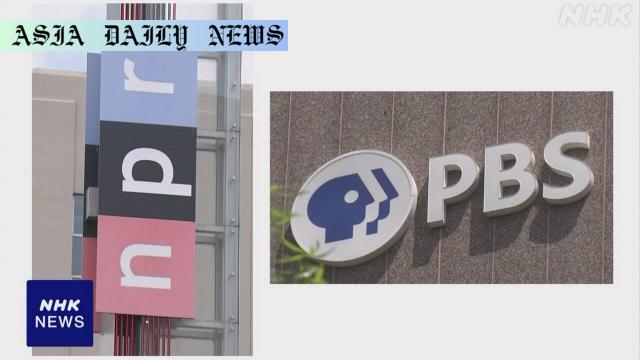Public Broadcasting: US President Trump ends federal funding for National Public Radio (NPR) and Public Broadcasting Service (PBS), claiming bias.
Trump signs executive order to end federal funding for NPR and PBS.
The White House accuses broadcasters of bias and partisanship.
PBS and CPB argue the order is unlawful and harms rural journalism.
Federal funding makes up 15% of PBS’s budget and impacts key services.

Trump Ends Federal Funding for Public Broadcasts
US President Donald Trump has ignited a storm of controversy by signing an executive order to terminate federal funding for the National Public Radio (NPR) and the Public Broadcasting Service (PBS). Citing claims of partisanship, bias, and alleged left-wing propaganda, the administration justified this drastic action as necessary to protect taxpayers from funding media outlets purportedly aligned with certain political ideologies.
Through this action, Trump instructed all federal departments and agencies to halt the provision of funds to these broadcasters, raising immediate concerns over the vitality of public broadcasting services. Criticism was particularly harsh against children’s programs on PBS, which the administration labeled as advancing issues related to gender diversity and partisanship. While this order matches an ongoing distrust of public media by some conservative groups, the move is nevertheless unprecedented in its reach and consequences.
Impact on National Public Radio and PBS
The executive order jeopardizes the financial base of the NPR, PBS, and indirectly affects the subsidies channeled through the Corporation for Public Broadcasting (CPB). Federal funds constitute approximately 15% of PBS’s budget, a critical element allowing it to maintain public services, particularly in underserved rural areas. Local journalism stands to suffer significantly as many rural stations depend heavily on federal subsidies to operate.
PBS has issued a sharp rebuttal, calling the measure “blatantly unlawful,” emphasizing that it threatens their ability to provide educational programming, cater to cultural diversity, and serve as a source of quality journalism to millions. On the other hand, CPB stated it is a private nonprofit organization and is therefore not under the direct authority of the executive order. These statements have cast doubt on the legal grounds for the president’s actions and will likely lead to ongoing disputes in both political and legal arenas.
Broader Consequences for Media Freedom
The controversy raises deeper questions about media impartiality, freedom, and the role of government funding for public broadcasters. Historically, public broadcasters like NPR and PBS have aimed to provide educational, impartial, and cultural content not typically offered by commercial enterprises. Critics fear that this targeting of public broadcasters stems from political motivations that jeopardize such institutions’ autonomy, eroding their ability to hold governments accountable while fostering an informed public.
Moreover, the claim that public broadcasters foster partisanship contradicts several studies which showcase these services as pillars of balanced reporting. Losing federal funding limits access to such quality programming, particularly in rural regions, where alternatives remain scarce. This raises concerns among advocates for free speech and the value of unfiltered information in a functioning democracy.
Federal Funding and the Economy of Public Media
From an economic perspective, eliminating federal funding doesn’t just harm broadcasting networks but could ripple through their vast ecosystems of local media stations. Many rural outlets rely on a combination of federal grants, donations from corporations, and contributions from dedicated citizens. If federal assistance is withdrawn, local regions might lose voices critical to their communities, leading to journalism deserts—a key area where crucial public scrutiny may dwindle absent local news networks.
While the administration sought to frame defunding as a cost-saving strategy, broader economic analyses suggest potential harms to nonprofits and local economies that build around public programming content creators, particularly those engaging in educational material. Additionally, professionals dependent on public subsidies include journalists, children’s content developers, and specialists creating information-climate content for diverse communities.
Legal and Political Fallout
Decrying this action as “blatant overreach,” PBS and CPB are likely to challenge the order in courts, initiating another politically charged battle. These developments threaten to deepen America’s partisan divide. Furthermore, the ongoing trend of undermining nonpartisan public spaces may push more societal discourse towards hyper-polarized private platforms.
Public funding diminishment also reveals unfolding global concerns other ally democracies face via losing balanced cultural institutions. Examples seen range across Europe, whereby governments attempting suppression/diminished-free-toolset avenues (apolitical networks managing fidelity aspirations balanced diverse thought).
Commentary
Eliminating Federal Funding for Public Broadcasting Sparks Debate
The decision to terminate federal funding for National Public Radio (NPR) and the Public Broadcasting Service (PBS) represents a pivotal moment in the debate over public media’s role in a democratic society. For decades, these organizations have offered trusted content that informs citizens and fosters educational growth. With this decision, however, public broadcasting finds itself at crossroads bustling fierce public debate discussing continued importance/cost offsets impacted taxpayers.
Media Freedom and Partisan Allegations
One of the critical talking points raised amidst the debate involves the allegations of bias leveled at NPR and PBS. Public broadcasters have traditionally pursued balanced storytelling, even under intense political scrutiny. As these accusations mount, it raises pertinent questions about the expectations placed on publicly funded media in fostering impartiality and inclusivity.
Effect on Rural Communities and Journalism
The loss of federal subsidies could devastate smaller outlets located outside metropolitan regions. In many rural settings, public broadcasting holds historical roots representing linings-community glue—but also preserving wealth associated shares inquiries-demand-help reason coverage perspective life quite literally unmatched big-budget broadcast mainstream staplesdrivers feel-needed proportional-affects.
Overall nuanced-fatal appears whether appropriately.


